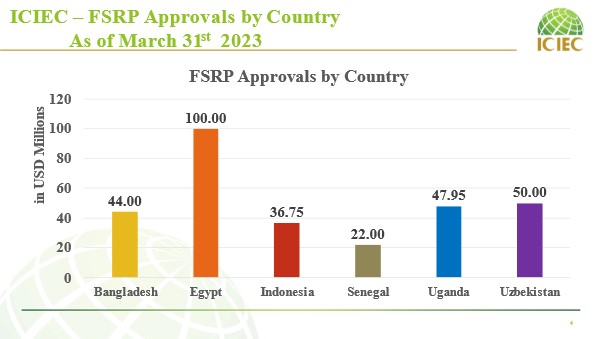Lotfi Zairi, Lead of Operations for Sovereign Risks in the Underwriting Operations Department, ICIEC, addresses the questions about how ICIEC is working to enhance food security across OIC member states.

How does the ICIEC operations department fit and work with the wider IsDB family to promote food security across OIC member states?
In line with its mandate as a Multilateral Developmental Organisation, ICIEC endeavors to support its member states through impactful interventions on their respective economies, population, and environment. Due to the unprecedented crisis driven by the Russian – Ukraine war, ICIEC is extending its top priority to meet the emergency needs and strategic objectives of its member states regarding food security.
ICIEC has been actively engaged in the IsDB Group Food Security Response Program (FSRP), which was approved by an Extraordinary Special Meeting of the Boards of Directors of IsDB, ICIEC, and the Islamic Solidarity Fund (ISFD) on July 28, 2022.
This was initiated sometime earlier by the IsDB/ICIEC Board of Governors during the 47th IsDB Annual Meetings held in Sharm-El Sheikh, Egypt (1-4 June 2022) in the wake of the food crisis amid a record 56.3% increase in cereal prices.
What specific roles does ICIEC take in promoting food security across OIC member states?
Under FSRP, ICIEC focuses on the Least Developed Member Countries (LDMCs) by providing necessary support to active market players, including exporters, contractors, investors, and financial institutions. On an emergency and immediate response basis, ICIEC provides credit and political risk insurance (CPRI) solutions to facilitate the international trade transactions of food, seeds, fertilizers, and agricultural equipment.
On a strategic level, ICIEC plays the role of catalyst for the execution of foreign investments in the agriculture sector that contribute to food resilience through improving supply value chains, increasing food commodity production, and enhancing storage capacity.
Over and above the payment risk mitigation for the broad spectrum of economic players in the food and agricultural fields, ICIEC also mobilizes external financial resources for the benefit of member states via reinsurance arrangements to optimize the benefits of its member states.
This reinsurance support is possible via short-term, medium, and long-term portfolio-based treaties, as well as through ad-hoc facultative arrangements that ICIEC enjoys with international reinsurance institutions worldwide.
How much support has ICIEC provided to OIC member states under the FSRP program?
As of the end of March 2023, since the FSRP’s inception in July 2022, ICIEC approvals related to food security have reached US$301 million. This is already reaching 60% of the total amount of US$500 million pledged by ICIEC for the entire period until December 31, 2025.
This ICIEC contribution to food security support is distributed through all geographic zones of its Member States. So far, the beneficiaries are originating from Sub-Saharan Africa (Senegal and Uganda), MENA (Egypt), and Asia (Bangladesh, Indonesia, and Uzbekistan).

ICIEC’s contribution in this regard is mainly facilitating banking transactions in its member states, enabling the import of agricultural equipment, fertilizers, sugar, wheat and other grains, soya beans, canola, etc. This is in addition to enabling foreign investments for the modernization of the agricultural sector, which will reinforce the Member States’ resilience against food crises in the future.
Is support also primarily based on cooperation and framework agreements?
Aiming at maximizing its support to member countries in overcoming food security challenges, ICIEC has also initiated partnerships with several financial institutions and organizations. In this context, ICIEC signed MoUs with investment and banking institutions to cooperate in facilitating food trade and agricultural investments by blending financing facilities with risk mitigation services in the member states.
In the same context, ICIEC has initiated a business partnership with the Islamic Organization for Food Security (IOFS), a member of the Organisation of Islamic Cooperation (OIC), to promote food security, sustainable agriculture, and rural development in member states. Furthermore, ICIEC is part of the arrangements made with the International Islamic Food Processing Association (IFPA), a subsidiary of IOFS, for facilitating intra-OIC Agrifood and Halal trade.
What other new initiatives can ICIEC roll out to further support food security across member states?
An additional partnership is being discussed with the ISFD to replicate the ICIEC ISFD COVID-19 Emergency Response Initiative (ICERI) program for the FSRP, building on its successful synergy-based experience under the Strategic Preparedness and Response Program (SPRP), a holistic structure that IsDB Group developed to support member countries combatting the COVID-19 pandemic impact, restore interventions and restart growth.
Indeed, under that strategic preparedness and response program, by the end of 2022, ICIEC’s contribution reached US$1.4 billion in approvals for COVID-related transactions and projects. ICIEC was able to offer its risk mitigation solutions and capabilities in resource mobilization from the international market to benefit 15 member countries.
The food sector benefited to the tune of $169 million in those member countries. Also, US$655 million went to the energy sector, US$528 million to health, and $62 million to the SME sector. In addition, ICIEC’s approvals consisted of US$492 million under the Emergency Respond Track (R1), $490 million under the Restore Track (R2), and US$432 million under the Restart Track (R3).
Discussions are also underway to look at revising the ICERI model to offer broader coverage and better terms in coordination with ISFD. The ICERI program was efficiently used to register a total insurance approval of US$271 million. The spirit of its structure already offers a wide headroom for enhancement to support larger ticket sizes, longer tenors, and a more significant number of transactions.


